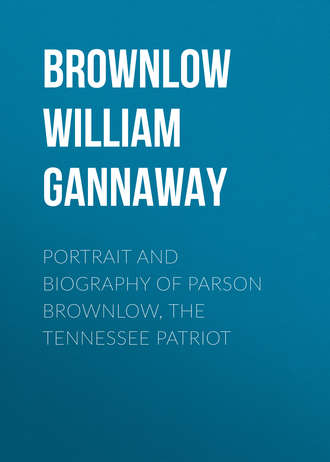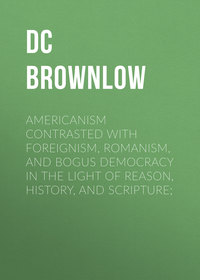 полная версия
полная версияPortrait and Biography of Parson Brownlow, The Tennessee Patriot
The speaker thought that the Union sentiment of Eastern Tennessee had never abated one iota; that there were thousands of good Union men there, who would hail the approach of the Federal army with sincere joy. Gen. Jackson put down the rebellion of 1832, and, though this was a much more formidable uprising, he believed Abe Lincoln would subdue it. "My friends," said the orator, "the hanging must begin on the other side, this season, and I want to superintend it. You may think I speak harshly; but, after what I have seen and experienced among the rebels, how can I feel differently? I tell you, my hearers, I intend to go back to Tennessee, before long, under different circumstances from those under which I left the State. I want to go back in company with Gen. Fremont; I want a big war-horse, and a military suite, and the General and myself will ride down among those rebels, and, if you will excuse my apparent egotism, I do believe the scoundrels had rather see the Devil coming after them!"
After paying his compliments to Mason and Slidell, both of whom he knows personally, the Parson remarked that, "When this rebellion is put down, England and France will have to behave themselves, or we will thrash them both."
The speaker then thanked the citizens for the kind reception given him, and closed his speech with the promise that they should hear from him again in the evening. He took his seat amid a storm of applause, that emanated from the hearts as well as the mouths of his hearers.
Gen. S. F. Cary, of Cincinnati, being present, was loudly called for, and, taking the stand, proceeded to deliver one of the most thrillingly eloquent speeches to which we have ever listened. We have not room for even a summary of this production, but those who are familiar with the celebrated Cincinnati orator will appreciate the meaning of our observation, when we say it was one of Gen. Cary's happiest efforts.
After he had closed, Frank Lumbard was called upon for a song, and, mounting the stand, gave, in his best style, "The Star Spangled Banner," the entire assemblage joining in the swelling chorus, with splendid effect. The crowd then filed out past the President's desk, where sat the Parson, each individual grasping his extended hand with evident emotions of sympathy and kindly regard. Mr. Brownlow and party soon after repaired to the Sherman House, where they partook of a sumptuous dinner.
In the afternoon the party made a visit to Camp Douglas, and spent some time in making observations among the very class of men from whose clutches the Parson had so recently escaped.


